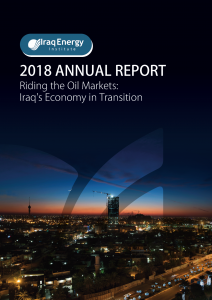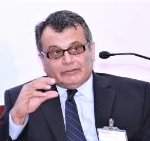 Iraq’s fortunes are once again highly dependent upon oil prices following a period where the government succeeded in stabilising expenditures, on the basis of IMF conditionality. This period was of course accompanied by the 2014-2017 war against the self-declared “Islamic State,” when Iraq was struggling through an existential conflict. During this difficult time, Iraq’s fundamental stability, on virtually every metric, was supported by the success of its energy sector.
Iraq’s fortunes are once again highly dependent upon oil prices following a period where the government succeeded in stabilising expenditures, on the basis of IMF conditionality. This period was of course accompanied by the 2014-2017 war against the self-declared “Islamic State,” when Iraq was struggling through an existential conflict. During this difficult time, Iraq’s fundamental stability, on virtually every metric, was supported by the success of its energy sector.
On that basis, 2018 carried good news for Iraq, not only due to rising oil prices. This report outlines some of the areas where oil and gas have truly contributed to energizing Iraq’s economy, looking at increasing gas utilization in southern Iraq, which now carries the real potential to alleviate Iraq’s electricity crisis. We examine growing cooperation between the Federal Government and the Kurdish Region of Iraq in the energy sector, which is increasingly based on a firmer legal footing with the passing of the 2019 budget law, which could in theory usher in a new era of Baghdad-Erbil relations.
In upstream oil and gas, we look at the growing potential of revitalised Kirkuk oilfields and Iraq’s success raising national production through 2018, with much now resting on the success of the Common Seawater Supply Project (CSSP), which could finally begin in the first quarter, with Iraq potentially partnering with Exxon and CNPC. In the north of Iraq, we look at the slow recovery of the Kurdish Region’s oil sector, and how this could result in net gains for the country. We also look at tentative progress in the refining sector, the success of which could save Iraq billions of dollars in refined product imports. Furthermore, the strides Iraq’s North Oil Company has been making to reposition itself as a contributor to national oil exports. Many of these are challenges that have affected Iraq for years, but 2018 was a year of positive momentum for oil and gas.
We also realise the energy sector cannot thrive without wider reforms in the political economy of Iraq. This report also covers major developments in the electricity sector and service delivery, vital for Iraq’s stability, as well as attempts to reform the business environment to tackle the crisis of unemployment and low non-oil revenue. These are incredibly urgent systemic issues that cannot be fixed with oil revenue alone, policy areas where Iraq needs to make difficult decisions, as our report outlines.
Download Report








![The Future of Oil in the Middle East: Building Diversified Economies in an Age of Energy Transition [Webinar Proceedings]](https://iraqenergy.org/wp-content/uploads/2020/09/Middle-East-Diversification-Webinar-Proceedings-Report-Image-356x364.jpg)
![Building Resilience? Iraq’s Economy and COVID-19 [Report]](https://iraqenergy.org/wp-content/uploads/2020/08/Building-Resilience-Iraq-economy-and-COVID-19-Report-Cover-356x364.jpg)





